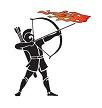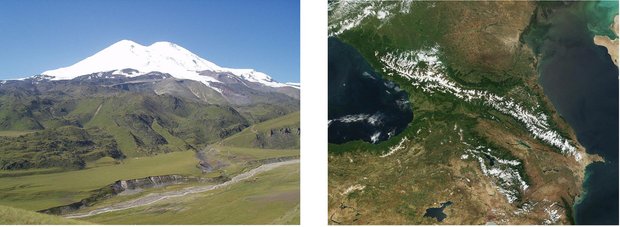
Odysseus
Isse from the island Od in Denmark
Olymp in Kavkas - Mountain of the gods
The mountain Olymp was the home of the Greek gods and is called Mingi Tau in Balkar, Elbrus in Farsi (Persian) and Ialbuzi in Georgian (kartuli ena). Elbrus is located in the mountain range Kavkaz.
In Russian and Turkish the mountain range is called Kavkaz, while the name Caucasus is a typical Greek name with a superfluous – S glued on after the name itself.
Here we will use the names Olymp, Mingi Tau, Elbrus and Kavkaz.
Mingi Tau in Balkar means eternal mountain or thousand mountain – in other words two (Thou) and sand.
Elbrus in Farsi means two peaks.
Ialbuzi on Georgian means snow ridge – snow mane, the ridge with snow.
Mingi Tau is the highest mountain in Europe, where the top to the west is 5642 m above sea level and the top to the east is 5621 meters above sea level.
The whole mountain massif is always covered in ice and snow.
It is a linguistic oddity that Basque elur – snow and buru – head together will form a Basque word elburu – snow head. The Word looks like a mix of Elbrus and Ialbuz.
The Olymp is mentioned eight times in the Odyssey and 44 times in the Iliad, and often as a description of the Elbrus – the mountain with two peaks:
– Set him free, by quickly calling up to high Olymp, the hundred-armed giant (Il.1-402)
– I’ll go myself to snow-peaked Mount Olymp … (Il.1-419, 18-186)
– She found Zeus, seated on the highest peak of many-ridged Olymp. (Il.1-499, Il.5-754, 8-2, 8-411)
– At once they reached the gods’ home, steep Olymp (Il.5-367, Il.5-868, Il.15-84)
– Athena rushed down from Olymp’s heights to sacred Ilion (Il.7-19)
–... nor do any other immortal gods inhabiting snow-capped Olymp. Il.18-186
– Then, like a hawk, she sped down from the snow-covered Olymp (Il.18-616)
– Hera then left that peak on Mount Olymp (Il.19-114)
– from the summit of many-ridged Olymp, Zeus told Themis (Il.20-4)
– I’ll stay here, sitting on a high peak on Mount Olymp (Il.20-22)
– Hermes left them and returned to high Olymp (Il.24-694)
The Olymp is mentioned eight times in the Odyssey and 44 times in the Iliad, and often as a description of Mingi Tau – the eternal mountain:
–… to the eternal ageless gods. Od.2-432
–... the eternal ones who hold wide heaven. Od.4-479
–... to the eternal gods, who hold wide heaven, Od.11-133
–…to eternal gods who hold wide heaven. Od.23-280
– … eternal gods who dwell on Mount Olymp ... Il.2-13, 2-30, 2-67
–... in thanks to the eternal, heavenly gods, once we have driven away from Troy ... Il.6-528
–... just in case some eternal Olympian god attacks you. Il.16-93
–... nor do any other eternal gods inhabiting snow-capped Olymp. Il.18-186
The Balkars are historically Alans and live in the Russian Republic of Kabardino-Balkar Republic in Kavkaz. The Balkars call themselves alan, and uses the name Alania about their country.
The Balkarian neighbors the Ossetians in Ossetia call them as and the Georgians in Sakartvelo (Georgia) call them az.
The Icelandic historian Snorre Sturlasson claims in Snorres Edda that the Nordic gods Odin and Thor, and the As (English: the Æsir) came from exactly the Kavkaz. In Old Norse, áss (or ǫ́ss, ás, plural æsir.
The Scythians, the Alans, the Sarmatians and the Asers are closely related nomadic people. Nomadic people usually have winter quarters where they lie still in winters, and often travel around during the summers. Alans – and thus the æsir — lived on the plains north of Kavkas and the Azov Sea, between the Don River with ancient Greek name Tanais – and the river Kuban.
Elbrus – Mingi Tau with its two peaks Kavkaz
